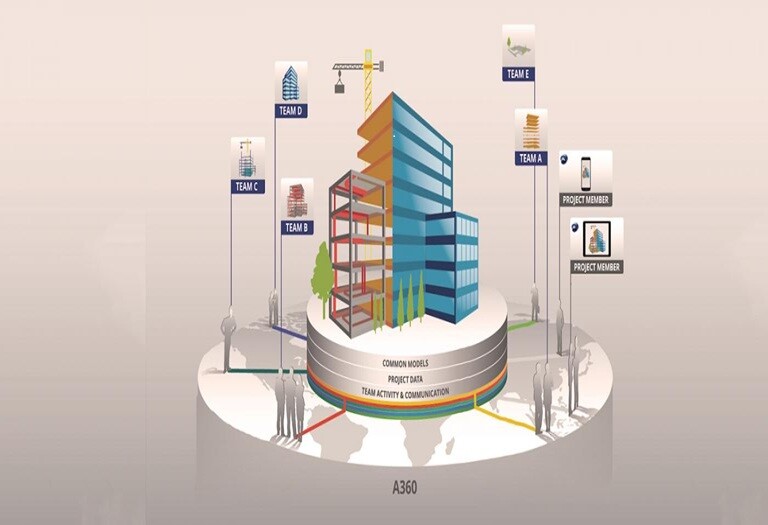Top 10 Certification Courses for Civil Engineers for Career Growth

Table of Contents
Civil engineering plays a crucial role in shaping the built environment. Civil engineers enable civilisation's progress, from planning, designing, and constructing infrastructure to ensuring sustainability. The global demand for infrastructure projects is soaring, and the opportunities for civil engineers to excel in their careers are endless. Having said that, civil engineering is a competitive field and staying ahead is equally crucial. The best way to do that is to enhance skills and knowledge.
Enrolling for certification courses for civil engineers is the best way towards career growth. Upskilling through courses helps enhance expertise and provides a competitive advantage in the crowded job market. Whether you are a recent graduate or a seasoned professional, opting for these offline and online certificate courses for civil engineers is a great option for you.
This blog will help you understand how you can choose the right civil engineering certificate course and the top 10 offline and online certificate courses that you can consider.
Read more : Top 10 BIM Software for Civil Engineers
Importance of Certification in Civil Engineering

With technological advances, the civil engineering industry continues to advance and diversify. Therefore, professional certification courses for civil engineers hold immense significance. The courses can boost your career prospects, provide growth opportunities with higher salaries, and validate your expertise in the competitive market. Understand at a deeper level how having a civil engineering certification can help you in more ways than one to stay ahead in your career:
1. Skill Enhancement
The foremost benefit of these offline and online certificate courses for civil engineers is that they are designed to provide in-depth knowledge and skills. . They focus on industry trends, the latest technologies, and best practices. By pursuing the course, you are investing in skill development and staying up-to-date with the latest advancements in the industry.
2. Validation of Expertise
Certificates serve as a validation of your skills and expertise, demonstrating that you possess the knowledge and competence required in the industry. This is particularly beneficial for those who have no work experience and have just started their career; a certificate will prove your capabilities to your potential employers.
3. Competitive Advantage
The job market is highly competitive and having a certificate will set you apart from the crowd. It will give you a significant advantage when applying for jobs. In addition, the industry is witnessing constant technological advances and the college curriculum is rarely updated with new topics and skills. Thus, civil engineering certificate courses will also help you learn advances in the industry, enhancing your holistic understanding of market trends.
4. Global Recognition
Several certification courses for civil engineers are globally recognised, opening doors for you to work around the world. Enrolling on civil engineering certificate courses is especially advantageous for you if you aspire to work on global projects with multinational companies.
5. Career Advancement
With a certification in civil engineering, you are more likely to be considered for higher-level leadership positions. It opens the doors for career prospects like project managers, design specialists, and consultants – one step further towards your career goals.
Read more : What is BIM in Civil Engineering & Why do Civil engineers love it?
How to Choose the Best Certification for Civil Engineers?

Choosing the best civil engineering certification can significantly enhance your skills, boost career prospects, and provide a high level of knowledge to succeed in leadership positions, increasing your potential for higher salaries. With so many offline and online civil engineering certificate courses available, zeroing in on the right one can be a difficult task. Read below a few factors that will help you make an informed decision:
1. Consider Your Career Goals
Several civil engineering certifications come with specialisations to help you delve into a specific civil engineering field.We’ll look at some of these civil engineering certificate programs as we move ahead in this blog. You can opt for specialisation courses as per your career aspirations to land your dream job.
2. Look for Industry Demand
Research the job market to understand which skills and specialisations are in demand. For instance, BIM is very much in demand in the industry with many architect and civil engineering firms hiring candidates with cutting-edge BIM skills. Talk to professionals and industry veterans in your field to gain insights to better understand what the industry demands at the moment. Look for industry trends and attend industry webinars to know more about industry happenings.
3. Research the Options
Research the various civil engineering certifications from credible organisations. Check whether a particular certification is popular among other civil engineers. If yes, then you can also opt for it to remain competitive in the industry. You can also reach out to your colleagues to inquire more about the certifications and know their value.
4. Check Accreditation and Review Prerequisites
Ensure that the certification course for civil engineers you are choosing is accredited and recognised in the industry. Also, the institutes offering courses have specific eligibility criteria, so ensure that you meet all these requirements.
5. Networking Opportunities
Some certifications and courses come with networking opportunities, which you can utilise to access resources that can aid in building your career. For example, Novatr offers you an opportunity to network with hiring partners via a placement team.Such courses can help you network with industry professionals and get ahead in the industry for a successful career.
5 Best Civil Engineering Certifications to Advance Your Career
Several valuable certification courses for civil engineers are available in the market that can enhance your skills and advance your career. You must keep in mind the popularity and relevance of certification courses for civil engineers can change over time, so it’s imperative to research the latest trends in the industry before opting for any course. Take a look at the top offline and online certificate courses for civil engineering:
|
Course Name |
Duration |
Preferable For |
Fees |
Certification |
|
BIM Professional Course for Civil Engineers – Novatr |
8 months |
Both beginner and experienced Civil Engineers |
₹ 1,95,000 |
Yes |
|
Structural Engineering: Building Design – Michigan Technological University |
1 or 2 semesters |
Both beginner and experienced Civil Engineers |
$32,345 / ₹ 2,800,030 |
Yes |
|
Project Management Professional (PMP) Course – Simplilearn |
3 months |
Beginners |
$699 |
Yes |
|
Certified Construction Manager (CCM) – CMAA |
Not defined |
Both beginner and experienced Civil Engineers |
Not specified |
Yes |
|
Civil 3D for Infrastructure Design – Autodesk |
Not defined |
Experienced Civil Engineers |
Not specified |
Yes |
1. BIM Professional Course for Civil Engineers – Novatr
Duration: Eight months
Mode: Online
Building Information Modelling (BIM) is the new buzzword in the market. It is reforming the civil engineering field and is quickly becoming the most-demand skill in the construction industry. Exposing you to modern technologies, BIM facilitates the designing of intricate 3D models for visualisation and problem-solving. Enrolling on a BIM course in civil engineering will reap long-term benefits for your career.
Novatr offers an online BIM course in civil engineering taught by top industry leaders. The course has an industry-specific curriculum, and an ISO-verified capstone project to help you gain hands-on experience in designing. Once you complete Novatr programme, you'll get industry recognized most valuable AutoCAD and NSDC certification. Novatr also offers guaranteed career assistance with portfolio feedback and LinkedIn profile optimisation.
Key Learnings:
- Basics of BIM
- Modelling Parametric Structure Families
- 10+ BIM Software like Revit, Tekla, and STAAD.pro
- BIM for Infrastructure
- BIM Processes and Workflow
- 4D and 5D BIM Modelling
- Model-Based Clash Detection and Coordination
2. Structural Engineering: Building Design – Michigan Technological University
Duration: One-two semesters
Mode: Online
Michigan Technological University offers an online certificate course in Structural Engineering: Building Design that prepares you for a wide range of careers in industries like architecture, building design, construction, and government. This course covers topics like structural analysis and how to work with different materials like concrete, steel, and timber. The course opens the gate for career opportunities in fields like Architecture, Interior Design, Building Inspection, Construction Management, and Project Management.
Key Learnings:
Group A:
- Structural Concrete Design
- Steel Design I
- Structural Timber Design
- Loads of Civil Structures
Group B:
- Advanced Structural Analysis
- Pre-stressed Concrete Design
- Concrete and Masonry Building Systems
- Steel Design II
- Advanced Structural Timber Design
Notably, you can design a custom program using elective courses, i.e., one course from Group A and two courses from Group B.
3. Project Management Professional (PMP) Course – Simplilearn
Duration: Three months
Mode: Online
Simplilearn offers an online certificate course that covers core topics vital for a project management professional (PMP). In this course, you get access to 90 days of flexible online classes taught by top instructors and practitioners. The PMP training course covers topics crucial for project management professionals like emerging trends, new technologies, and core competencies.
Key Learnings:
- Work Breakdown Structure
- Resource Allocation
- Gantt Charts
- Mathematical Project Scheduling Models
- Project Cost Estimation
- Cost Management
- Engineering Economics
- Leadership
Read more : Top In-Demand Civil Engineering Specialisations
4. Certified Construction Manager (CCM) – CMAA
Duration: Not defined
Mode: Not defined
The Construction Manager Certification Institute, the administrative arm of the Construction Management Association of America offers a CCM certification valid for three years. This certification course for civil engineers is specially designed for individuals who want to achieve greater heights in the construction industry. To enrol for the course, you need to have a college degree in the relevant field. However, in case you don’t have a college degree, minimum of four years of construction management experience will also work. Potential careers with this certificate course include Construction Manager, Sustainability Consultant, and Field Engineer.
Key Learnings:
- Program & Project Management
- Safety Management
- Cost Management
- Risk Management
- Time Management
- Professional Practice
- Contract Administration
- Sustainability
- Quality Management
- Technology
5. Civil 3D for Infrastructure Design – Autodesk
Duration: Not defined
Mode: Online
The CIVIL 3D Infrastructure Design skills certification from Autodesk demonstrates your advanced skills in solving complex challenges in design and workflow. This certification requires a minimum of 12,00 hours of civil 3D software experience and is valid for three years. The exam length is two hours and the potential career options after completing the certification course by Autodesk include Senior Civil Design Engineer, Senior Civil Engineer, and Civil Engineering Technician
6. Certified QA QC Course – SMEC
Duration: 1 month
Mode: Online/Offline/Hybrid
Another popular certification for Civil Engineers is offered by SMEC. This certified QA QC course is specifically designed for working professionals. With this course, civil engineers can get a deeper understanding of Quality Assurance, Quality Control, and safety management in construction. This course is beneficial for civil engineers as it helps them prevent project delays and reworks. Also, it allows civil engineers to ensure they meet the industry standards and regulations.
Key Learnings:
- QA/QC Documentation
- Quality Control Plan
- QC Checklist for Construction
- Process and Approval Construction
- Project Management
- Safety Management System
- Project Specifications
7. Professional Certificate in Construction Management– edX
Duration: 4 months
Mode: Not Defined
This professional certificate in construction management by edX enhances your proficiency in delivering successful construction projects. This self-paced course covers topics like project delivery methods, the use of BIM to support project design and future trends in sustainable construction management. Divided into four skill-building courses, each course is a step towards enhancing your skillset in construction management. Potential career prospects include construction manager, product manager, sustainability consultant, to name a few.
Key Learnings:
- Construction Management
- Project Delivery Methods
- Cost Estimation
- Project Planning
- Administrative Tools in Construction Management
- Sustainable Management
8. Fundamentals of Structural Analysis - Udemy
Duration: 3 hours 11 minutes
Mode: Online
This course by Udemy is conducted by Dr. Sean Carroll, a senior lecturer in structural engineering at the University of Exeter in the UK. Covering the fundamental concepts in static structural it highlights the distinction between model prediction and real-world structural behaviour. This course focuses on the link between theory and practice and how the model of structural behaviour map in the real world.
Key Learnings:
- Use of Joint Resolution Method
- Use of Method of Section
- Difference between Simplified Analysis Model and Behaviour of Real-world Structure
- Support reactions for structures subject to a range of loading conditions
9. Civil Infrastructure Construction Certificate Program - ASCE
Duration: Not Specified
Mode: Online
The Civil Infrastructure Construction Certificate Program by American Society of Civil Engineers prepares the professionals in a variety of construction related roles to effectively manage contracts and plan and schedule heavy civil infrastructure projects with specialized knowledge for working in unit pricing models. This program focuses on providing practical knowledge of construction engineering.
10. Civil Engineering Programs - RICE USA
Duration: Not specified
Mode: Online/Offline
From construction practice and procedure to advanced concrete technology, this course from Royal Institute of Chartered Engineers is a comprehensive program for civil engineers especially for the ones interested in Structural Engineering. This certification demonstrates your specialisation in the field of engineering as RICE is one of the largest engineering institutions in the world.
Conclusion
Whether offline or online certificate courses for civil engineering, choosing the right one can be a transformative step for your career. Certification courses enhance your credibility and bolster confidence in your respective field. They demonstrate your skills, knowledge, and commitment to excellence. In this fast-paced industry, staying competitive is crucial, and so is choosing the best certification course for civil engineers. With this comprehensive guide, we hope you will get all your answers.
BIM skills are high in demand and can give you a highly rewarding career opportunity. Take your first step towards becoming a BIM expert with Novatr’s BIM course for civil engineers!
Frequently Asked Questions
1. Which are the most valuable certifications for civil engineers?
Building Information Modelling BIM) adds significant value to a Civil Enineer’s resume. Certification of LEED Accreditation is also one of the best certifications for Civil Engineers. However, Chartered Engineer (CE), Civil Engineering Certification CEC) and Professional Engineer License (PE) are some of the certifications that add value to civil engineer’s skills.
2. How do certifications help experienced civil professionals?
Certifications showcase a higher level of expertise, validating the civil engineer’s skills and knowledge. It also helps in enhancing their credibility in the market leading them to higher salaries. Along with career advancement, it also helps in building professional network for civil professionals.
3. Are certifications necessary for fresh graduates in civil engineering?
Although, there are several benefits of having a certification in civil engineering, fresh graduates do not need it necessarily.

 Thanks for connecting!
Thanks for connecting!





.png)



.jpg)


